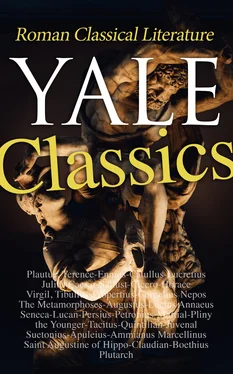"It is so," says Antonius; "and as to this kind of oratory, I know that I myself, and all who were present, were extremely delighted when your mother Popilia 20was honoured with a panegyric by you; the first woman, I think, to whom such honour was ever paid in this city. But it does not seem to me that all subjects on which we speak are to be included in art, and made subject to rules; for from those fountains, whence all the ornaments of speech are drawn, we may also take the ornaments of panegyric, without requiring elementary instructions; for who is ignorant, though no one teach him, what qualities are to be commended in any person? For if we but look to those things which Crassus has mentioned, in the beginning of the speech which he delivered when censor in opposition to his colleague, 21that in those things which are bestowed on mankind by nature or fortune, he could contentedly allow himself to be outdone; but that in whatever men could procure for themselves, he could not suffer himself to be outdone, he who would pronounce the panegyric of any person, will understand that he must expound on the blessings of fortune; and these are advantages of birth, wealth, relationship, friends, resources, health, beauty, strength, talent, and such other qualities as are either personal, or dependent on circumstances; and, if he possessed these, he must show that he made a proper use of them; if not, that he managed wisely without them; if he lost them, that he bore the loss with resignation; he must then state what he whom he praises did or suffered with wisdom, or with liberality, or with fortitude, or with justice, or with honour, or with piety, or with gratitude, or with humanity, or, in a word, under the influence of any virtue. These particulars, and whatever others are of similar kind, will easily be observed by whoever is inclined to praise any person; and the contrary will easily be observed by whoever is inclined to blame him." "Why then do you hesitate," said Catulus, "to make this a third kind, since it is so in the nature of things? for if it is more easy than others, it is not, on that account, to be excluded from the number." ". Because I am unwilling," replied Antonius, "to treat of all that falls under the province of an orator, as if nothing, however small it may be, could be uttered without regard to stated rules. Evidence, for instance, is often to be given, and sometimes with great exactness, as I was obliged to give mine against Sextus Titius, 22a seditious and turbulent member of the community; when, in delivering my evidence, I explained all the proceedings of my consulate, in which I, on behalf of the commonwealth, opposed him as tribune of the people, and exposed all that I thought he had done contrary to the interest of the state; I was detained long, I listened to much, I answered many objections; but would you therefore wish, when you give precepts on eloquence, to add any instructions on giving evidence as a portion of the art of oratory?"
"There is, indeed," said Catulus, "no necessity." "Or if (as often happens to the greatest men) communications are to be delivered, either in the senate from a commander in chief, or to such a commander, or from the senate to any king or people, does it appear to you that because, on such subjects, we must use a more accurate sort of language than ordinary, this kind of speaking should be counted as a department of eloquence, and he furnished with peculiar precepts?" "By no means," replied Catulus; "for an eloquent man, in speaking on subjects of that sort, will not be at a loss for that talent which he has acquired by practice on other matters and topics." "Those other kinds of subjects, therefore,' continued Antonius, "which often require to be treated with eloquence, and which, as I said just now, (when I was praising eloquence,) belong to the orator, have neither any place in the division of the parts of oratory, nor fall under any peculiar kind of rules, and yet must be handled as eloquently as arguments in pleadings; such are reproof, exhortation, consolation, all which demand the finest graces of language; yet these matters need no rules from art." "I am decidedly of that opinion," said Catulus. "Well, then, to proceed," said Antonius, "what sort of orator, or how great a master of language, do you think it requires to write history?" "If to write it as the Greeks have written, a man of the highest powers," said Catulus; "if as our own countrymen, there is no need of an orator; it is sufficient for the writer to tell truth." "But," replied Antonius, "so that you may not despise those of our own country, the Greeks themselves too wrote at first just like our Cato, and Pictor, and Piso. For history was nothing else but a compilation of annals; and accordingly, for the sake of preserving the memory of public events, the pontifex maximus used to commit to writing the occurrences of every year, from the earliest period of Roman affairs to the time of the pontifex Publius Mucius, and had them engraved on white tablets, which he set forth as a register in his own house, so that all the people were able to inspect it; and these records are still called the Great Annals. This mode of writing many have adopted, and, without any ornaments of style, have left behind them simple chronicles of times, persons, places, and events. Such, therefore, as were Pherecydes, Hellanicus, Acusilas, 23and many others among the Greeks, are Cato, and Pictor, and Piso with us, who neither understand how composition is to be adorned (for ornaments of style have been but recently introduced among us), and, provided what they related can be understood, think brevity of expression the only merit. Antipater, 24an excellent man, the friend of Crassus, raised himself a little, and gave history a higher tone; the others were not embellishers of facts, but mere narrators."
"It is," rejoined Catulus, "as you say; but Antipater himself neither diversified his narrative by variety of thoughts, nor polished his style by an apt arrangement of words, or a smooth and equal flow of language, but rough-hewed it as he could, being a man of no learning, and not extremely well qualified for an orator; yet he excelled, as you say, his predecessors." "It is far from being wonderful," said Antonius, "if history has not yet achieved distinction in our language; for none of our countrymen study eloquence, unless that it may be displayed in lawsuits and in the forum; whereas among the Greeks, the most eloquent men, wholly unconnected with public pleading, applied themselves as well to other honourable studies as to writing history; for of Herodotus himself, who first embellished this kind of writing, we hear that he was never engaged in pleading; yet his eloquence is so great as to delight me extremely, as far as I can understand Greek writing. After him, in my opinion, Thucydides has certainly surpassed all historians in the art of composition; for he is so abundant in matter, that he almost equals the number of his words by the number of his thoughts; and he is so happy and judicious in his expressions, 25that you are at a loss to decide whether his facts are set off by his style, or his style by his thoughts; and of him too we do not hear, though he was engaged in public affairs, that he was of the number of those who pleaded cases, and he is said to have written his books at a time when he was far removed from civic life, and, as usually happened to every eminent man at Athens, was driven into banishment. He was followed by Philistus 26of Syracuse, who, living in great familiarity with the tyrant Dionysius, spent his leisure in writing history, and, as I think, principally imitated Thucydides But afterwards, two men of great genius, Theopompus and Ephorus, coming from what we may call the noblest school of rhetoric, applied themselves to history at the prompting of their master Isocrates, and were never involved in pleading at all.
Читать дальше












